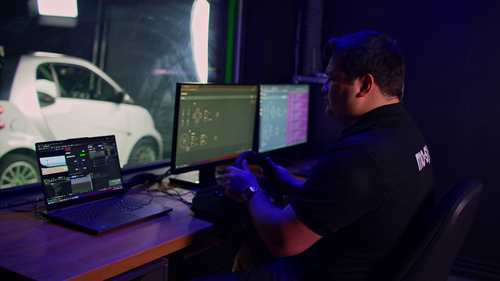What does a film crew do?
As film-making has got more technologically-advanced, film crews have changed in composition. Whilst the core remains the same (directors, producers, technicians, and camera operators) – there are many more roles which have opened up as a result of virtual production (VP). If you’re considering a career within the film industry and are wondering, ‘what does a film crew do?’, read on to learn about the main positions, and how they’re changing as VP progresses.
Film crew roles explained
Producer
Producers are the driving force behind productions. They oversee projects from start to finish, making decisions about key concepts, creative processes, and finances. Whilst they’re mostly focused on organisation and operational functions, they also hold sway over script selection, directing, and editing.
Director
Directors, on the other hand, are much more involved in the creative side of filmmaking. They set the artistic direction of the production, and guide the technicians on how to achieve it. Alongside deciding on shots and angles, directors oversee casting, set design, and musical score.
Scriptwriter
Scriptwriters are often the starting point of film productions. They provide the initial idea of a story, and craft it into a compelling narrative. They shape characters, give them a voice, and make them believable. Although scriptwriters are often in the shadow of producers and directors, they’re a fundamental part of the filmmaking process.
Production designer
Working closely with producers and directors, production designers are responsible for the visual concept of a film. This covers location spotting, set design, costume design, lighting, and visual effects. As VP becomes more popular, moreover, production designers are collaborating more with graphic designers and VFX artists in the pre-production phase – ultimately, shortening time and money spent in post-production.
Production manager
Reporting to the producer, production managers deal with the day-to-day running of film projects. They’re responsible for hiring film crew members, managing running budgets, and organising shooting schedules. You might consider them the on-the-ground project managers of the filmmaking process.
Cinematographer/ Director of Photography (DP)
The DP transforms the director’s vision into reality through their technical knowledge. Traditionally, they advise on which cameras, lenses, filters, and stock to use to achieve the desired shots. Similarly to production designers, their role is increasingly influenced by VP. They need to be aware of how virtual production systems integrate with standard studio equipment such as lighting and rigging, and how to set up and calibrate VP gear.
Focus puller
In traditional filmmaking, a focus puller works alongside a camera operator to manually bring actors and objects into focus at the right time. Moving with the camera, they adjust the lens to according to the distance between themselves and the object they want to focus on. They may put markers down before filming (like sellotape on the floor of the set) to help them, or they may just rely on their own spatial awareness as the camera is rolling. Whilst their role is likely to change with the increasing use of VP methods, they’ll remain incredibly important on set. The production team of Jon Favreu’s The Lion King (2019), showed how focus pullers can be integrated into a new way of multi-track filming methods.
Director of Virtual Production (DVP)
As VP progresses, however, it’s becoming more common to hire a separate Director of Virtual Production (DVP), who concentrates solely on VP during a project. Although the role is developing along with the tech, DVP’s are generally responsible for managing virtual props, dealing with VFX vendors, overseeing the pre-production phase, and transferring assets to graphic engines.
Digital Image Technician (DIT)
In a broad sense, the DIT ensures that the highest technical standards are maintained when filming. As experts of the latest camera technology and associated software, they advise the DP and DVP on any issues relating to digital (rather than film) recording, including contrasts, exposure, framing, and focus. They’re also responsible that all film data is stored and managed correctly, making regular backups and transferring into file types that are accessible to other departments in post production.
Films crews and changing technology
As VP technology advances, the traditional roles within film crews are adapting. Whilst directors, producers, and DPs are becoming more aware of the advantages of VP – including greater creative freedom, fewer resources required, and less time needed – new roles are emerging to operate highly specialised VP tech. Ultimately, the days of large film crews moving between locations like travelling circuses are gone – replaced with remote, more agile and technically-enabled teams.
Want to learn more about virtual production and the film industry? Take a look at articles from Mo-Sys Academy. We’re here to help educate and inform those looking to make their first steps into the world of filmmaking.




